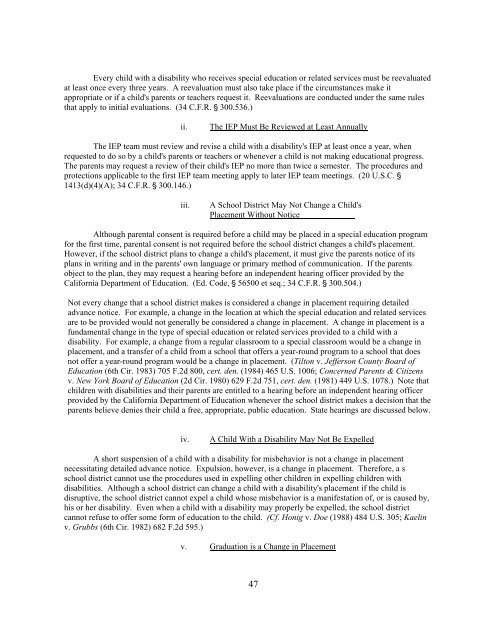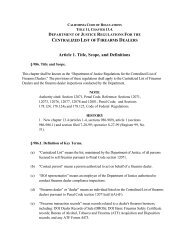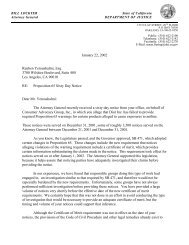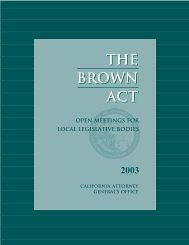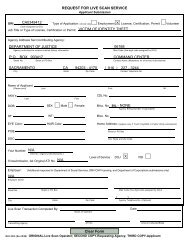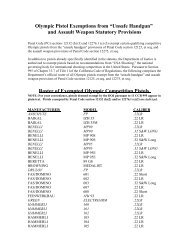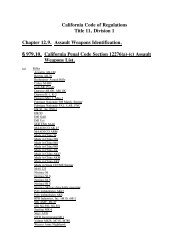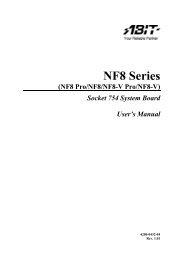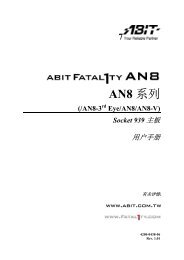Legal Rights of Persons With Disabilities - Ossh.com
Legal Rights of Persons With Disabilities - Ossh.com
Legal Rights of Persons With Disabilities - Ossh.com
Create successful ePaper yourself
Turn your PDF publications into a flip-book with our unique Google optimized e-Paper software.
Every child with a disability who receives special education or related services must be reevaluated<br />
at least once every three years. A reevaluation must also take place if the circumstances make it<br />
appropriate or if a child's parents or teachers request it. Reevaluations are conducted under the same rules<br />
that apply to initial evaluations. (34 C.F.R. ' 300.536.)<br />
ii.<br />
The IEP Must Be Reviewed at Least Annually<br />
The IEP team must review and revise a child with a disability's IEP at least once a year, when<br />
requested to do so by a child's parents or teachers or whenever a child is not making educational progress.<br />
The parents may request a review <strong>of</strong> their child's IEP no more than twice a semester. The procedures and<br />
protections applicable to the first IEP team meeting apply to later IEP team meetings. (20 U.S.C. '<br />
1413(d)(4)(A); 34 C.F.R. ' 300.146.)<br />
iii.<br />
A School District May Not Change a Child's<br />
Placement <strong>With</strong>out Notice<br />
Although parental consent is required before a child may be placed in a special education program<br />
for the first time, parental consent is not required before the school district changes a child's placement.<br />
However, if the school district plans to change a child's placement, it must give the parents notice <strong>of</strong> its<br />
plans in writing and in the parents' own language or primary method <strong>of</strong> <strong>com</strong>munication. If the parents<br />
object to the plan, they may request a hearing before an independent hearing <strong>of</strong>ficer provided by the<br />
California Department <strong>of</strong> Education. (Ed. Code, ' 56500 et seq.; 34 C.F.R. ' 300.504.)<br />
Not every change that a school district makes is considered a change in placement requiring detailed<br />
advance notice. For example, a change in the location at which the special education and related services<br />
are to be provided would not generally be considered a change in placement. A change in placement is a<br />
fundamental change in the type <strong>of</strong> special education or related services provided to a child with a<br />
disability. For example, a change from a regular classroom to a special classroom would be a change in<br />
placement, and a transfer <strong>of</strong> a child from a school that <strong>of</strong>fers a year-round program to a school that does<br />
not <strong>of</strong>fer a year-round program would be a change in placement. (Tilton v. Jefferson County Board <strong>of</strong><br />
Education (6th Cir. 1983) 705 F.2d 800, cert. den. (1984) 465 U.S. 1006; Concerned Parents & Citizens<br />
v. New York Board <strong>of</strong> Education (2d Cir. 1980) 629 F.2d 751, cert. den. (1981) 449 U.S. 1078.) Note that<br />
children with disabilities and their parents are entitled to a hearing before an independent hearing <strong>of</strong>ficer<br />
provided by the California Department <strong>of</strong> Education whenever the school district makes a decision that the<br />
parents believe denies their child a free, appropriate, public education. State hearings are discussed below.<br />
iv.<br />
A Child <strong>With</strong> a Disability May Not Be Expelled<br />
A short suspension <strong>of</strong> a child with a disability for misbehavior is not a change in placement<br />
necessitating detailed advance notice. Expulsion, however, is a change in placement. Therefore, a s<br />
school district cannot use the procedures used in expelling other children in expelling children with<br />
disabilities. Although a school district can change a child with a disability's placement if the child is<br />
disruptive, the school district cannot expel a child whose misbehavior is a manifestation <strong>of</strong>, or is caused by,<br />
his or her disability. Even when a child with a disability may properly be expelled, the school district<br />
cannot refuse to <strong>of</strong>fer some form <strong>of</strong> education to the child. (Cf. Honig v. Doe (1988) 484 U.S. 305; Kaelin<br />
v. Grubbs (6th Cir. 1982) 682 F.2d 595.)<br />
v. Graduation is a Change in Placement<br />
47


